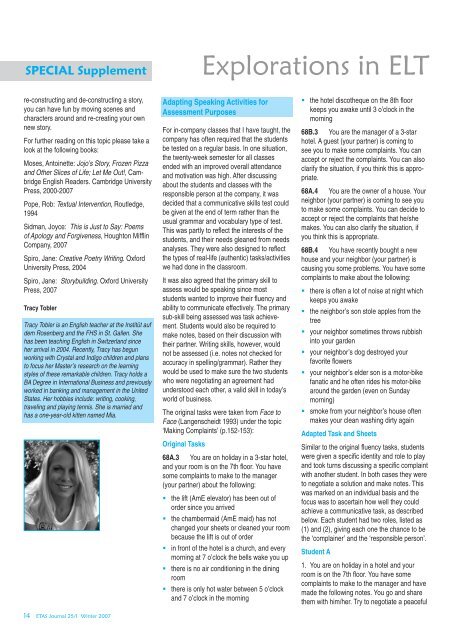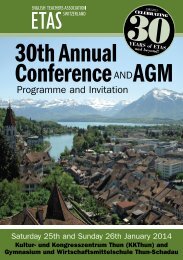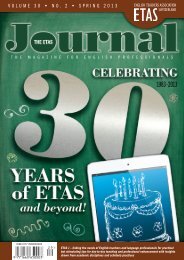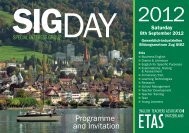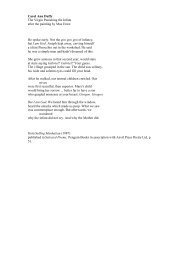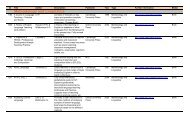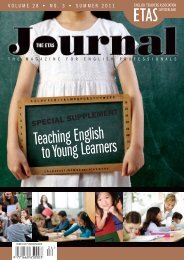The Magazine for English Professionals - English Teachers ...
The Magazine for English Professionals - English Teachers ...
The Magazine for English Professionals - English Teachers ...
Create successful ePaper yourself
Turn your PDF publications into a flip-book with our unique Google optimized e-Paper software.
SPECIAL Supplement Explorations in ELT<br />
re-constructing and de-constructing a story,<br />
you can have fun by moving scenes and<br />
characters around and re-creating your own<br />
new story.<br />
For further reading on this topic please take a<br />
look at the following books:<br />
Moses, Antoinette: Jojo’s Story, Frozen Pizza<br />
and Other Slices of Life; Let Me Out!, Cambridge<br />
<strong>English</strong> Readers. Cambridge University<br />
Press, 2000-2007<br />
Pope, Rob: Textual Intervention, Routledge,<br />
1994<br />
Sidman, Joyce: This is Just to Say: Poems<br />
of Apology and Forgiveness, Houghton Mifflin<br />
Company, 2007<br />
Spiro, Jane: Creative Poetry Writing. Ox<strong>for</strong>d<br />
University Press, 2004<br />
Spiro, Jane: Storybuilding. Ox<strong>for</strong>d University<br />
Press, 2007<br />
Tracy Tobler<br />
Tracy Tobler is an <strong>English</strong> teacher at the Institüt auf<br />
dem Rosenberg and the FHS in St. Gallen. She<br />
has been teaching <strong>English</strong> in Switzerland since<br />
her arrival in 2004. Recently, Tracy has begun<br />
working with Crystal and Indigo children and plans<br />
to focus her Master’s research on the learning<br />
styles of these remarkable children. Tracy holds a<br />
BA Degree in International Business and previously<br />
worked in banking and management in the United<br />
States. Her hobbies include: writing, cooking,<br />
traveling and playing tennis. She is married and<br />
has a one-year-old kitten named Mia.<br />
14 ETAS Journal 25/1 Winter 2007<br />
Adapting Speaking Activities <strong>for</strong><br />
Assessment Purposes<br />
For in-company classes that I have taught, the<br />
company has often required that the students<br />
be tested on a regular basis. In one situation,<br />
the twenty-week semester <strong>for</strong> all classes<br />
ended with an improved overall attendance<br />
and motivation was high. After discussing<br />
about the students and classes with the<br />
responsible person at the company, it was<br />
decided that a communicative skills test could<br />
be given at the end of term rather than the<br />
usual grammar and vocabulary type of test.<br />
This was partly to reflect the interests of the<br />
students, and their needs gleaned from needs<br />
analyses. <strong>The</strong>y were also designed to reflect<br />
the types of real-life (authentic) tasks/activities<br />
we had done in the classroom.<br />
It was also agreed that the primary skill to<br />
assess would be speaking since most<br />
students wanted to improve their fluency and<br />
ability to communicate effectively. <strong>The</strong> primary<br />
sub-skill being assessed was task achievement.<br />
Students would also be required to<br />
make notes, based on their discussion with<br />
their partner. Writing skills, however, would<br />
not be assessed (i.e. notes not checked <strong>for</strong><br />
accuracy in spelling/grammar). Rather they<br />
would be used to make sure the two students<br />
who were negotiating an agreement had<br />
understood each other, a valid skill in today’s<br />
world of business.<br />
<strong>The</strong> original tasks were taken from Face to<br />
Face (Langenscheidt 1993) under the topic<br />
‘Making Complaints’ (p.152-153):<br />
Original Tasks<br />
68A.3 You are on holiday in a 3-star hotel,<br />
and your room is on the 7th floor. You have<br />
some complaints to make to the manager<br />
(your partner) about the following:<br />
� the lift (AmE elevator) has been out of<br />
order since you arrived<br />
� the chambermaid (AmE maid) has not<br />
changed your sheets or cleaned your room<br />
because the lift is out of order<br />
� in front of the hotel is a church, and every<br />
morning at 7 o’clock the bells wake you up<br />
� there is no air conditioning in the dining<br />
room<br />
� there is only hot water between 5 o’clock<br />
and 7 o’clock in the morning<br />
� the hotel discotheque on the 8th floor<br />
keeps you awake until 3 o’clock in the<br />
morning<br />
68B.3 You are the manager of a 3-star<br />
hotel. A guest (your partner) is coming to<br />
see you to make some complaints. You can<br />
accept or reject the complaints. You can also<br />
clarify the situation, if you think this is appropriate.<br />
68A.4 You are the owner of a house. Your<br />
neighbor (your partner) is coming to see you<br />
to make some complaints. You can decide to<br />
accept or reject the complaints that he/she<br />
makes. You can also clarify the situation, if<br />
you think this is appropriate.<br />
68B.4 You have recently bought a new<br />
house and your neighbor (your partner) is<br />
causing you some problems. You have some<br />
complaints to make about the following:<br />
� there is often a lot of noise at night which<br />
keeps you awake<br />
� the neighbor’s son stole apples from the<br />
tree<br />
� your neighbor sometimes throws rubbish<br />
into your garden<br />
� your neighbor’s dog destroyed your<br />
favorite flowers<br />
� your neighbor’s elder son is a motor-bike<br />
fanatic and he often rides his motor-bike<br />
around the garden (even on Sunday<br />
morning)<br />
� smoke from your neighbor’s house often<br />
makes your clean washing dirty again<br />
Adapted Task and Sheets<br />
Similar to the original fluency tasks, students<br />
were given a specific identity and role to play<br />
and took turns discussing a specific complaint<br />
with another student. In both cases they were<br />
to negotiate a solution and make notes. This<br />
was marked on an individual basis and the<br />
focus was to ascertain how well they could<br />
achieve a communicative task, as described<br />
below. Each student had two roles, listed as<br />
(1) and (2), giving each one the chance to be<br />
the ‘complainer’ and the ‘responsible person’.<br />
Student A<br />
1. You are on holiday in a hotel and your<br />
room is on the 7th floor. You have some<br />
complaints to make to the manager and have<br />
made the following notes. You go and share<br />
them with him/her. Try to negotiate a peaceful


